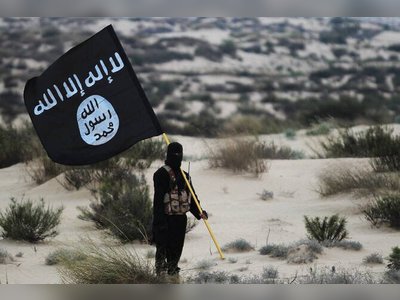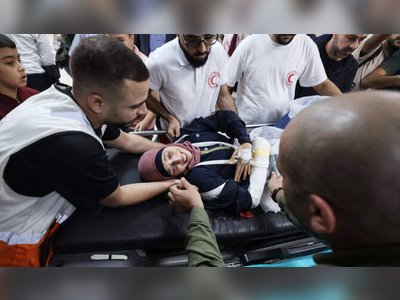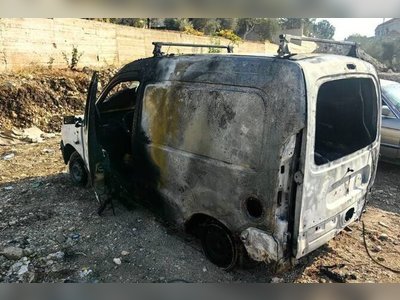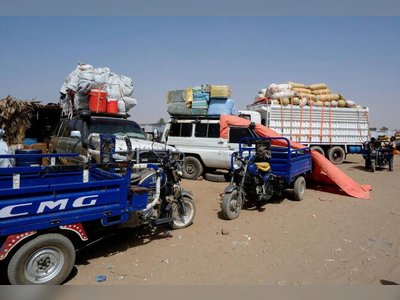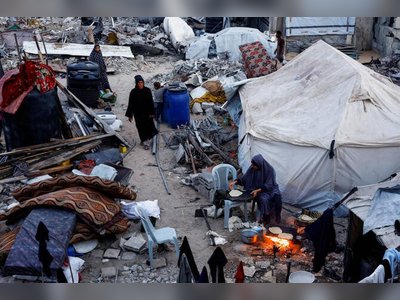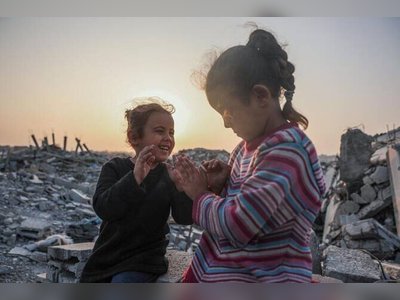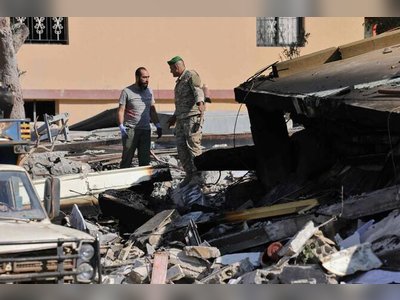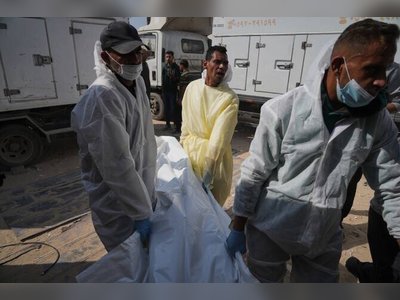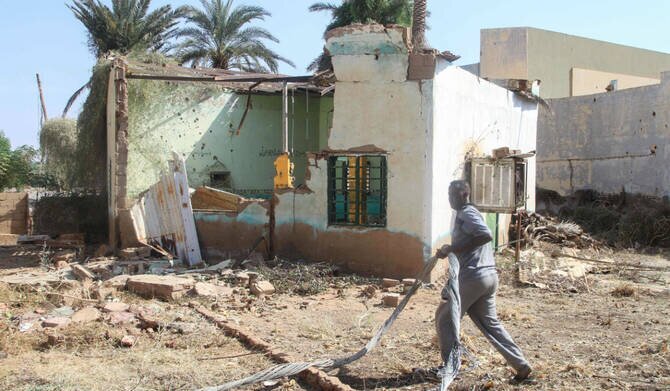
Medical Charity Warns of Missing Civilians in El-Fasher
The medical charity Doctors Without Borders, or MSF, warns that the fate of hundreds of thousands fleeing ethnically targeted violence from Sudan's western city of El-Fasher remains unknown.
Johannesburg: The medical charity Doctors Without Borders (MSF), also known as Médecins Sans Frontières, has raised an alarm over the uncertain fate of hundreds of thousands of civilians fleeing ethnic violence from El-Fasher, a city in Sudan's Darfur region.
Satellite images have revealed suspected mass graves, intensifying concerns about the safety and whereabouts of the displaced populations.According to MSF President Javid Abdelmoneim, the organization has observed approximately 5,000 individuals entering Tawila, located roughly 70 kilometers west of El-Fasher, but they are concerned that many more civilians remain unaccounted for.
The targeting of violence by the Rapid Support Forces (RSF) against ethnic groups adds to the distressing situation.The town of Tawila serves as a makeshift shelter for those fleeing El-Fasher; however, the area lacks adequate resources to accommodate the influx of displaced individuals.
Those who find refuge in Tawila are often forced to rely on improvised shelters made from tarps and sheets.
Videos from the region reveal children and adults struggling to survive amidst scarce food supplies and inadequate living conditions.Numerous aid organizations report that tens of thousands of Sudanese have sought refuge in overcrowded camps to escape the alleged atrocities taking place in El-Fasher.
The United Nations (UN) human rights chief has expressed concern over the fate of civilians still trapped within El-Fasher, who are allegedly being prevented from leaving by armed forces.Reports of executions, sexual violence, and abductions have emerged following the RSF's seizure of control over El-Fasher last October.
Survivors recount 'harrowing' accounts of ethnically targeted torture, rape, and summary executions to MSF.
Furthermore, six out of ten adults surveyed display signs of starvation.The fall of El-Fasher has given the RSF control over all five state capitals in Darfur, heightening concerns about a potential partition of Sudan along an east-west axis.
Yale University's Humanitarian Research Lab (HRL) has identified earth disturbances consistent with mass graves at a mosque and the former Children's Hospital, indicating potential body disposal activities.The ongoing conflict in Sudan has resulted in tens of thousands of deaths and millions displaced, exacerbating what is already the world's largest displacement and hunger crisis.
Since the RSF took control of El-Fasher on October 26th, over 16,200 individuals have fled to camps in Tawila, according to Adam Rojal, a spokesperson for the General Coordination for Displaced Persons and Refugees in Darfur.
The displaced in Tawila urgently require food, medical supplies, shelter materials, and psychosocial support.The International Organization for Migration estimates that around 82,000 individuals have fled El-Fasher and surrounding areas as of November 4th, with many seeking refuge in Tawila.
MSF reported on Friday that approximately 300 people arrived in Tawila on Thursday alone after fleeing from El-Fasher.
Malnutrition levels among children and adults remain extremely high.UN Human Rights Chief Volker Turk emphasized the risks faced by those left behind in El-Fasher, stating that civilians continue to be trapped within the city despite the ongoing violence.
He warned that atrocities such as summary executions, rape, and ethnically motivated violence persist, even as some manage to escape to safer areas where they face further hardships.The conflict has spread across Darfur and into neighboring Kordofan, with both regions emerging as key battlegrounds in recent months.
Early this week, a drone attack targeted El-Obeid, the capital of North Kordofan province, resulting in the deaths of at least 40 individuals and leaving dozens more injured.
Armed Conflict Location and Event Data (ACLED) analyst Jalale Getachew Birru highlighted that these events deepen Sudan's humanitarian crisis while also signifying the RSF's growing capacity to expand into central Sudan, posing a threat to the success achieved by the Sudanese armed forces.
Satellite images have revealed suspected mass graves, intensifying concerns about the safety and whereabouts of the displaced populations.According to MSF President Javid Abdelmoneim, the organization has observed approximately 5,000 individuals entering Tawila, located roughly 70 kilometers west of El-Fasher, but they are concerned that many more civilians remain unaccounted for.
The targeting of violence by the Rapid Support Forces (RSF) against ethnic groups adds to the distressing situation.The town of Tawila serves as a makeshift shelter for those fleeing El-Fasher; however, the area lacks adequate resources to accommodate the influx of displaced individuals.
Those who find refuge in Tawila are often forced to rely on improvised shelters made from tarps and sheets.
Videos from the region reveal children and adults struggling to survive amidst scarce food supplies and inadequate living conditions.Numerous aid organizations report that tens of thousands of Sudanese have sought refuge in overcrowded camps to escape the alleged atrocities taking place in El-Fasher.
The United Nations (UN) human rights chief has expressed concern over the fate of civilians still trapped within El-Fasher, who are allegedly being prevented from leaving by armed forces.Reports of executions, sexual violence, and abductions have emerged following the RSF's seizure of control over El-Fasher last October.
Survivors recount 'harrowing' accounts of ethnically targeted torture, rape, and summary executions to MSF.
Furthermore, six out of ten adults surveyed display signs of starvation.The fall of El-Fasher has given the RSF control over all five state capitals in Darfur, heightening concerns about a potential partition of Sudan along an east-west axis.
Yale University's Humanitarian Research Lab (HRL) has identified earth disturbances consistent with mass graves at a mosque and the former Children's Hospital, indicating potential body disposal activities.The ongoing conflict in Sudan has resulted in tens of thousands of deaths and millions displaced, exacerbating what is already the world's largest displacement and hunger crisis.
Since the RSF took control of El-Fasher on October 26th, over 16,200 individuals have fled to camps in Tawila, according to Adam Rojal, a spokesperson for the General Coordination for Displaced Persons and Refugees in Darfur.
The displaced in Tawila urgently require food, medical supplies, shelter materials, and psychosocial support.The International Organization for Migration estimates that around 82,000 individuals have fled El-Fasher and surrounding areas as of November 4th, with many seeking refuge in Tawila.
MSF reported on Friday that approximately 300 people arrived in Tawila on Thursday alone after fleeing from El-Fasher.
Malnutrition levels among children and adults remain extremely high.UN Human Rights Chief Volker Turk emphasized the risks faced by those left behind in El-Fasher, stating that civilians continue to be trapped within the city despite the ongoing violence.
He warned that atrocities such as summary executions, rape, and ethnically motivated violence persist, even as some manage to escape to safer areas where they face further hardships.The conflict has spread across Darfur and into neighboring Kordofan, with both regions emerging as key battlegrounds in recent months.
Early this week, a drone attack targeted El-Obeid, the capital of North Kordofan province, resulting in the deaths of at least 40 individuals and leaving dozens more injured.
Armed Conflict Location and Event Data (ACLED) analyst Jalale Getachew Birru highlighted that these events deepen Sudan's humanitarian crisis while also signifying the RSF's growing capacity to expand into central Sudan, posing a threat to the success achieved by the Sudanese armed forces.
